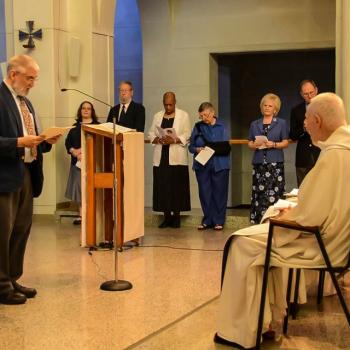![By Frmir (Own work) [GFDL or CC BY-SA 3.0], via Wikimedia Commons](https://wp-media.patheos.com/blogs/sites/388/2015/02/256px-TinnitusBooks-225x300.jpg)
I am interested in the subject of meditation and Christian meditation in general, but I have a minor concern. I would like to engage in practices like centering prayer, but in the instructions for these meditations, I often hear an emphasis on finding a silent place to engage in these activities. I don’t have problems finding a silent place, but silence is not something that I carry with me. I have a condition called Tinnitus that causes me to perceive a ringing sound in my ear, and this ringing sound will likely not be going away anytime soon. So when I sit in a room and I attempt to repeat the sacred words to myself in centering prayer; I can’t help but notice my tinnitus. I can’t help but have a thought or two about the ringing in my ear. I can’t help but have some form of “engagement” with it. It’s not something that I can turn off of my own willpower. Perhaps I have misunderstood the instructions, and if I have then I apologize, but have you met individuals with tinnitus who practice meditation? Is it something that is possible to do with such a condition? Am I making Tinnitus the obstacle that it is not?
Thanks for writing, Nick, and I am so sorry about the suffering related to your tinnitus. I would hardly consider it a “minor concern”! I hope you can find relief.
I do not have tinnitus and so of course my response will be that of someone who does not share your experience. But I hope that these thoughts might be helpful, for you or for anyone else with tinnitus who is seeking to practice a form of silent or contemplative prayer.
I think the first point to keep in mind is that there are different qualities of silence. Generally speaking, silent prayer is easiest when we find a place of external silence, which is to say, devoid of ambient sounds such as TV, radio, the Internet, MP3 players, and so forth. It is possible to engage in a silent prayer practice even in the midst of tremendous noise, but such noise is typically distracting, making the prayer more difficult. So the first step, as much as is possible, is to find a time and a place relatively free of external sound.
But then there’s the question of internal sound. For most people, the inner noise we encounter in prayer includes thoughts, emotions, imagination, and any other kind of content that distracts us from gently resting in the present moment. Tinnitus is another such inner sound, maybe more challenging since many people experience it as an ongoing noise. But Nick, even if you were suddenly cured of the tinnitus and the symptoms disappeared, the next time you tried to sit for silent prayer, all the other sources of inner noise and distraction would still be there.
One of the most common misconceptions about contemplative practices like centering prayer or the Jesus Prayer is that it involves “emptying the mind.” Even the 11th-century Brief Rule of Saint Romuald instructs the aspiring contemplative to “empty yourself completely and sit waiting.” But I think it’s important to understand such instructions in a dynamic sense: the goal here is to turn away from distractions, not to achieve a “pure” emptiness or silence. The mind cannot be totally empty any more than the heart can stop breathing. If either of those things happen, we die. So even for an experienced contemplative, silent prayer includes some experience of thinking, feeling, imagining. Perhaps a more useful word than “emptiness” is “stability.” The inner stability that we seek is the ability to hold the normal “chatter” of our awareness lightly and gently, and whenever we are distracted to respond by returning to the focus of our prayer: our breath, our sacred word, or a simple prayer like the Jesus Prayer.
The Cloud of Unknowing talks about approaching the inner chatter in an almost playful way. It’s like being in a public place and being accosted by someone you don’t want to talk to — say, someone taking a survey. While the person is talking to you, you keep looking over their shoulder, trying to find the person who are actually there to meet. In silent prayer, the “survey-taker” is whatever might be distracting us: thoughts, feelings, images, anxieties, pain (or tinnitus). So the point behind the prayer is to keep “looking over the shoulder” of the distraction, seeking the One we really wish be meet: God, the source of Divine Love and healing, who is always present but whose presence is often hidden to us.
For a person without tinnitus, the presence of God is hidden in silence, which is why contemplation makes such a fuss over silence and a synonym for it is “silent prayer.” But for you, Nick, it seems that your contemplative practice means recognizing that, for you, God is not just hidden in the silence, but also in the ringing (or however you would describe your tinnitus). The basic gesture of contemplation — approaching your prayer time in a spirit of openness and relaxation, seeking not to control the prayer but rather consent to the presence of God in your life, even though it may be a hidden presence — would be the same, even in the presenting the ongoing ringing sound. So it seems to me that the path forward for you would be to focus less on silence (or the lack of silence) and more on that gesture, that willingness to let go of all the other types of inner noise (thoughts, images, feelings, and so forth) and simply rest in the present moment, even though for you, the silence you encounter is a “ringing” silence.
I hope this is helpful. Try it out and let me know how it goes.
Finally, I would invite you to do some research in Mindfulness-Based Stress Reduction (MBSR) which is a therapy developed in Boston by Jon Kabat Zinn and others to apply a secular form ofmeditation and yoga practice to the management of medical and psychological conditions such as chronic stress and depression. Apparently research is very encouraging that such practices can have a beneficial effect. I did a brief search online and found this paper: Mindfulness Based Tinnitus Stress Reduction Pilot Study. I haven’t read it, but based on the abstract it looks promising. Perhaps for you, contemplation might not only be a way to draw closer to God, but also a way to alleviate your tinnitus suffering as well.
Does anyone else have advice for Nick? If you have tinnitus, how do you approach silent prayer? I’d love to hear from you.
Enjoy reading this blog?
Click here to become a patron.














